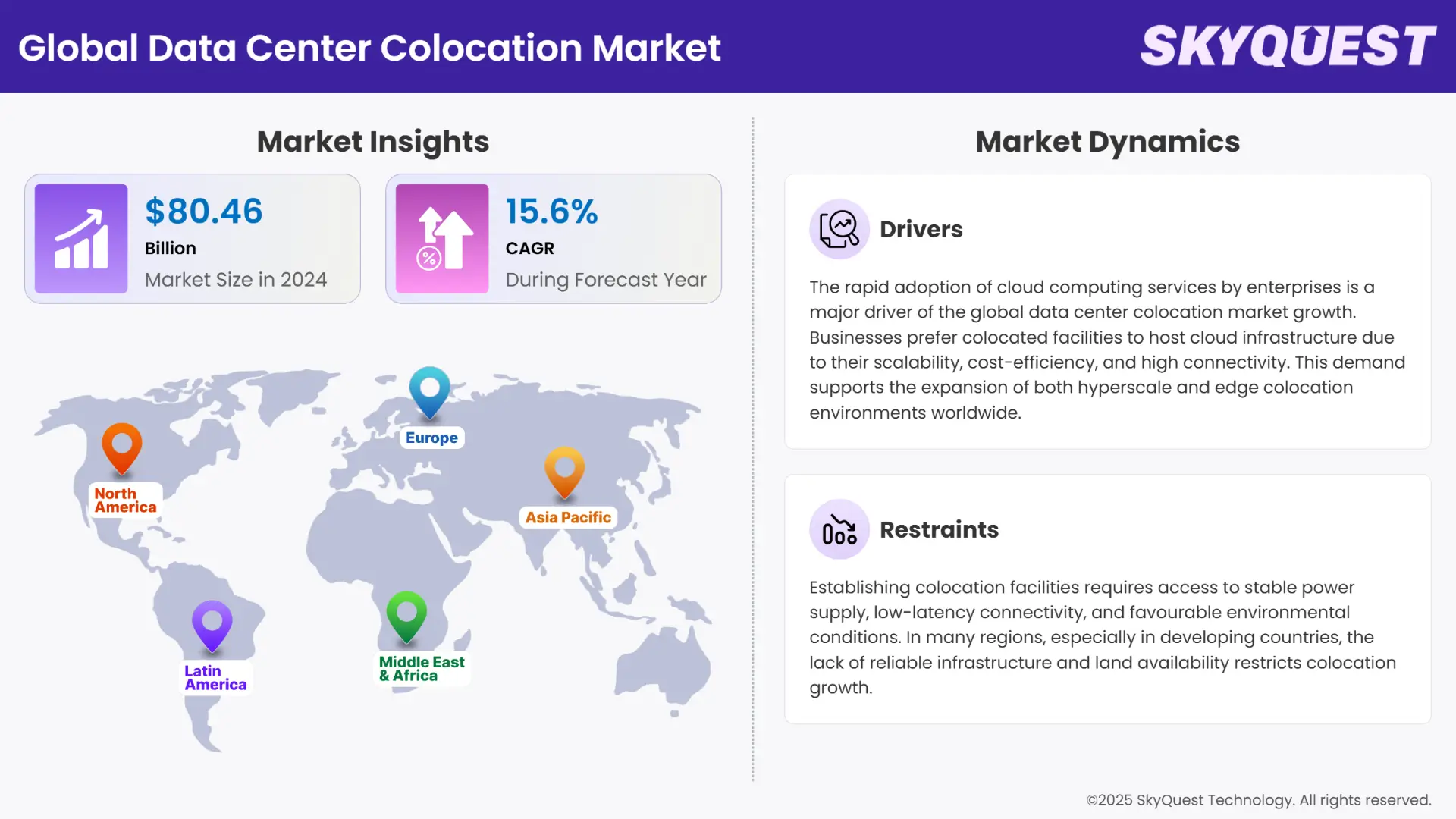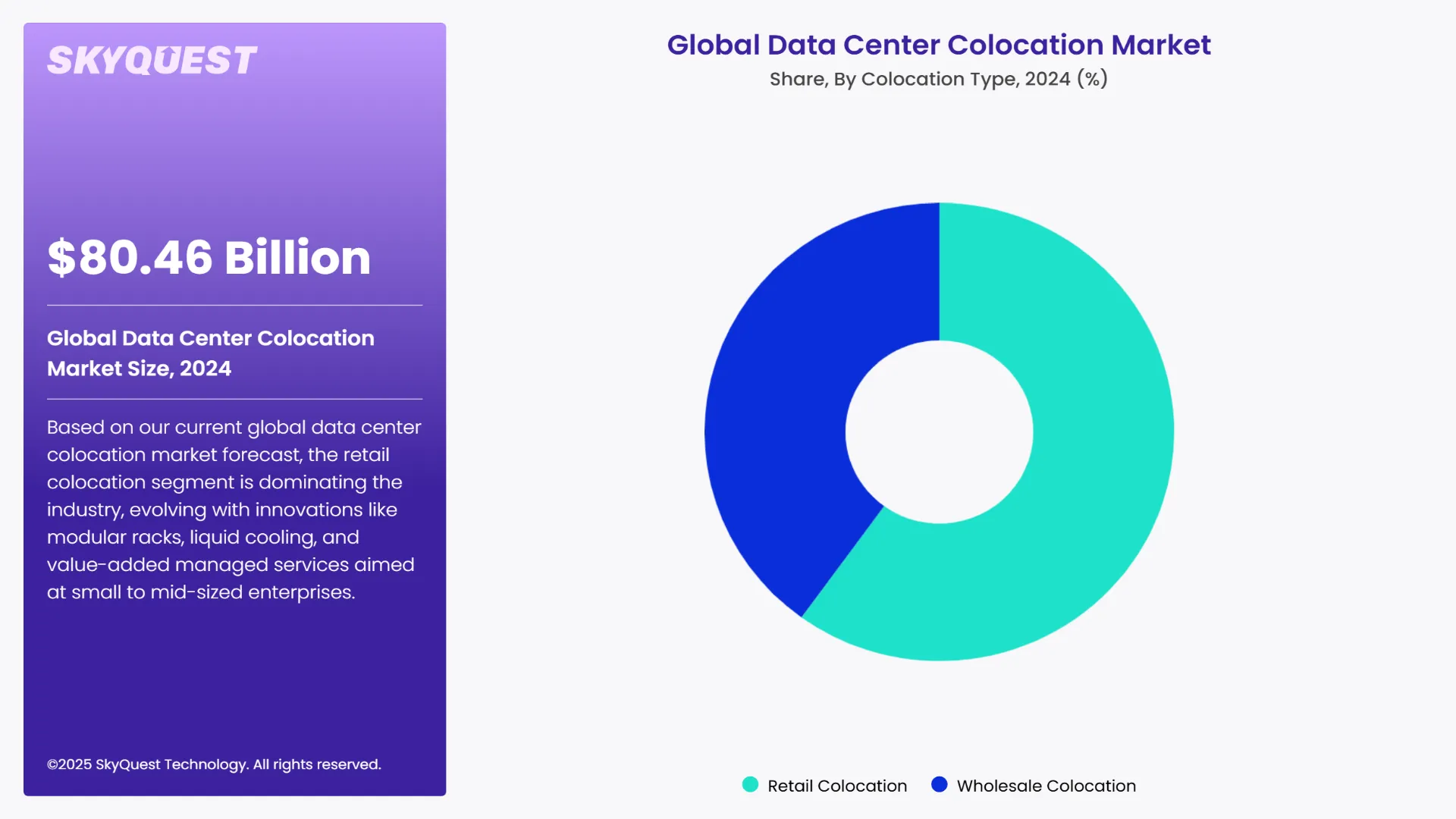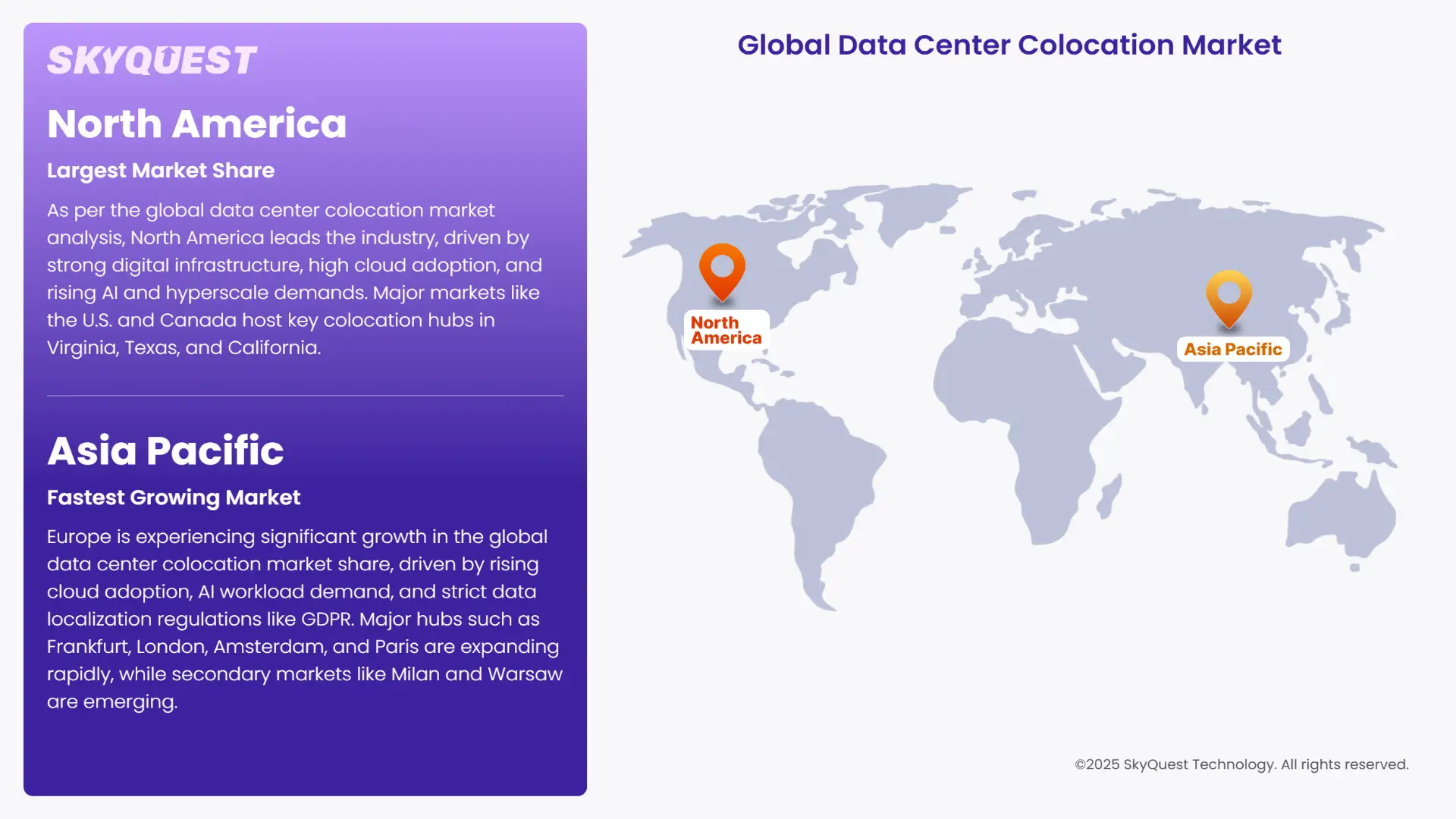
Report ID: SQMIG45C2036

Report ID: SQMIG45C2036
sales@skyquestt.com
USA +1 351-333-4748

Report ID:
SQMIG45C2036 |
Region:
Global |
Published Date: June, 2025
Pages:
194
|Tables:
91
|Figures:
71



Global Data Center Colocation Market size was valued at USD 80.46 Billion in 2024 poised to grow between USD 93.01 Billion in 2025 to USD 296.62 Billion by 2033, growing at a CAGR of 15.6% in the forecast period (2026–2033).
As the digital transformation revolution spreads across industries like finance, healthcare and eCommerce, organizations are faced with increasing pressures to increase their IT capacity without the massive costs associated with infrastructure. Data center colocation allows an organization to cost-effectively provision scalable amounts of power, space and cooling through a shared plan with one or more other organizations. When using the colocation approach, organizations can scale up or down based on demand. They get additional security and compliance options, maintenance time and uptime, but do not have the burden associated with fully owned IT infrastructure. Therefore, the increasing demand for agile, scalable IT infrastructure has been one of the driving forces behind growth in the colocation market.
The global shift toward cloud computing and hybrid IT environments has been significant key trend driving the global data center colocation sector. Enterprises increasingly rely on hybrid workloads that span both on-premises and cloud-based systems, demanding seamless integration and low-latency connectivity. Many colocation facilities are near there the big cloud providers. This means they can interconnect directly with them, allowing high-speed data transfer. With colocated infrastructure, organizations can distribute workloads faster, applications perform faster, and they can ensure business continuity in-between cloud providers. Colocation also answers organizations security, data sovereignty and regulatory compliance—vital elements of any hybrid strategy. As cloud adoption increases, colocated infrastructure will function as an essential means to optimize performance of hybrid workloads and operational agility.
How much Power Can AI-Ready Colocation Services Now Support Per Rack?
The rapid rise of artificial intelligence applications is significantly increasing demand for high-density computing infrastructure. AI workloads, especially those involving machine learning and large language models, require powerful GPUs and TPUs, which consume more energy and generate greater heat. This causes data center colocation providers to upgrade facilities with high-power racks, advanced liquid cooling systems, and enhanced connectivity. In response, companies like Digital Realty are launching AI-ready colocation services supporting up to 70 kW per rack. Furthermore, AI is also being used internally by colocation providers to optimize power usage, cooling efficiency, and predictive maintenance, further boosting operational effectiveness.
Deutsche Telekom and Nvidia announced in June 2025 the launch of Europe’s first industrial AI cloud in Germany, powered by Nvidia’s 10,000 AI chips and hosted within Deutsche Telekom’s data center network. This collaboration enhances colocation of market relevance by integrating AI-driven infrastructure directly into industrial data centers.

To get more insights on this market click here to Request a Free Sample Report
The global data center colocation market is segmented based on colocation type, enterprise size, end use, and region. In terms of colocation type, the market is bifurcated into retail colocation-1 and wholesale colocation. Based on enterprise size, the market is bifurcated into large enterprises and SMEs. Based on end use, the market is segmented into retail, BFSI, IT & telecom, healthcare, media & entertainment, and others. Based on region, the market is segmented into North America, Europe, Asia-Pacific, Central & South America and the Middle East & Africa.
Based on our current global data center colocation market forecast, the retail colocation segment is dominating the industry, evolving with innovations like modular racks, liquid cooling, and value-added managed services aimed at small to mid-sized enterprises. These clients benefit from scalable, shared infrastructure without high capital investment. Its dominance stems from low entry barriers, flexible leasing options, and simplified deployment. Retail colocation meets growing IT demands efficiently, making it the preferred choice for businesses seeking agility, cost control, and access to enterprise-level facilities.
Wholesale colocation is poised for rapid growth in the global data center colation market, as hyperscalers and large enterprises, driven by AI, cloud, and big data demands, increasingly seek entire data halls with high power density and customization. This model delivers economies of scale, lower per‑unit costs, and faster deployment—making it the fastest‑growing segment globally.
Large enterprises segment dominate the global data center colocation market, adopting advanced colocation solutions featuring hybrid cloud connectivity, high-density racks, and sustainable infrastructure to support complex, data-intensive operations. Innovations like software-defined networking and AI-based energy optimization are tailored to meet their needs. Their dominance in the market is driven by large-scale IT requirements, strict compliance demands, and the need for secure, scalable environments—making colocation a cost-effective and reliable alternative to building and managing private data centers.
SMEs are the fastest‑growing segment in the global data center colocation market, due to cost-effective, scalable IT infrastructure that avoids high capital expenditure. They benefit from pay-as-you-go leasing, advanced security, and managed services—enabling agility and digital growth. As their data needs to expand, colocation becomes the preferred, flexible alternative.

To get detailed segments analysis, Request a Free Sample Report
As per the global data center colocation market analysis, North America leads the industry, driven by strong digital infrastructure, high cloud adoption, and rising AI and hyperscale demands. Major markets like the U.S. and Canada host key colocation hubs in Virginia, Texas, and California. Growth is fueled by enterprise demand for scalable, secure facilities and the integration of renewable energy solutions, positioning the region as a leader in innovation, capacity, and sustainable colocation development.
The United States is the largest contributor to North America’s data center colocation market, driven by widespread digitalization, strong cloud adoption, and demand from hyperscalers. Major hubs like Northern Virginia, Silicon Valley, and Dallas support large-scale infrastructure with high power capacity and network density. Investments in AI-ready facilities and renewable energy integration further enhance the U.S.’s dominance, making it a global leader in colocation capacity and innovation.
Canada is emerging as a key player in North America’s data center colocation market, supported by its stable climate, renewable energy availability, and rising demand for edge and cloud services. Data center
growth in cities like Toronto, Montreal, and Vancouver is accelerating, with hyperscalers and enterprises expanding operations. Government support, competitive electricity rates, and focus on sustainable infrastructure are driving Canada's increasing role in the regional location.
Europe is experiencing significant growth in the global data center colocation market share, driven by rising cloud adoption, AI workload demand, and strict data localization regulations like GDPR. Major hubs such as Frankfurt, London, Amsterdam, and Paris are expanding rapidly, while secondary markets like Milan and Warsaw are emerging. Additionally, strong sustainability mandates, including renewable energy usage and heat reuse initiatives, are shaping colocation strategies and driving green infrastructure investments across the region.
Germany is a leading contributor to Europe’s data center colocation market, driven by high data localization standards, strong industrial digitization, and Frankfurt’s role as a major internet exchange hub. The country’s colocation demand is fueled by enterprises and hyperscalers seeking secure, scalable infrastructure. With robust connectivity, renewable energy initiatives, and smart city projects, Germany continues to attract large-scale investments, cementing its position as a strategic and sustainable colocation destination in Europe.
France plays a pivotal role in the Europe data center colocation market with Paris serving as a central hub for data centers. Strict GDPR compliance, strong telecom infrastructure, and support for green data initiatives attract both regional and international clients. With government support and rising AI investments, France is rapidly scaling high-density colocation facilities, making it a preferred destination for hyperscalers and cloud service providers seeking performance, regulation compliance, and energy-efficient infrastructure.
The United Kingdom, particularly London, is a major colocation center due to its role in global finance, mature cloud ecosystem, and high network density. Home to leading providers and interconnection hubs like LINX, the UK supports mission-critical workloads. Despite Brexit, strong regulatory standards, sustainable energy integration, and hyperscaler expansions have sustained growth, positioning the UK as a resilient and technologically advanced colocation market in the global data center ecosystem.
Asia Pacific is witnessing rapid growth in the global data center colocation market due to increasing cloud adoption, expanding digital economies, and investments in AI and 5G. Countries like China, India, Japan, and Australia lead the region, while emerging markets like Malaysia, Indonesia, and Vietnam are gaining momentum. The region’s strategic connectivity, rising data localization policies, and focus on green infrastructure make it a key global destination for colocation expansion and innovation.
Japan plays a significant role in the Asia Pacific data center colocation market, supported by strong digital infrastructure and high demand for cloud and AI services. Tokyo and Osaka serve as major data center hubs, attracting investments from global providers like Equinix and Digital Realty. The country’s emphasis on energy-efficient, earthquake-resistant facilities and rapid digital transformation across industries strengthens its position as a stable, technologically advanced colocation destination in the Asia Pacific region.
South Korea contributes significantly to the Asia Pacific data center colocation market with its advanced connectivity, dense urban infrastructure, and rising demand for AI, 5G, and cloud computing services. Seoul is the central hub for major colocation providers, including KT Cloud and SK Broadband. Government initiatives supporting smart cities and digital innovation, along with investments from global players, are fueling market growth and enhancing South Korea’s reputation as a high-performance, reliable colocation environment.

To know more about the market opportunities by region and country, click here to
Buy The Complete Report
Rising Cloud Adoption
Surge in AI and Data-Intensive Workloads
Limited Availability of Suitable Locations
Latency Issues in Remote Regions
Request Free Customization of this report to help us to meet your business objectives.
The global data center colocation market outlook is highly competitive, with key players including Equinix, Digital Realty, NTT Communications, CyrusOne, and China Telecom. Companies focus on global expansion, strategic partnerships, and sustainability. For example, Equinix is investing in green energy and expanding in emerging markets, while Digital Realty is focusing on AI-ready infrastructure and interconnection services. NTT is enhancing edge capabilities to support 5G and IoT demands across Asia and beyond.
As pe the global data center colocation industry analysis, the market is witnessing a surge in startup activity, driven by rising demand for energy efficiency, edge infrastructure, and AI-optimized computing. These startups focus on modular designs, green power integration, and rapid deployment models to meet evolving enterprise needs. By leveraging advanced R&D, they provide innovative alternatives to traditional colocation models, addressing gaps in scalability, sustainability, and specialized workload support—particularly for AI and data-intensive applications across diverse geographies.
SkyQuest’s ABIRAW (Advanced Business Intelligence, Research & Analysis Wing) is our Business Information Services team that Collects, Collates, Correlates, and Analyses the Data collected by means of Primary Exploratory Research backed by robust Secondary Desk research.
As per SkyQuest analysis, the global data center colocation industry is evolving rapidly, driven by digital transformation, AI adoption, and the proliferation of hybrid IT environments. As enterprises seek scalable, cost-effective, and high-performance infrastructure, colocation emerges as a strategic enabler—offering advanced connectivity, operational agility, and sustainability. AI’s growing computational demands are accelerating the shift toward high-density, GPU-ready colocation facilities, while startups introduce modular, energy-efficient solutions.
Simultaneously, the global data center colocation market share is witnessing strong regional momentum, especially in North America, Europe, and Asia Pacific. With rising cloud workloads and ESG mandates, colocation providers are investing in green technologies and expanding strategic partnerships. Together, these trends highlight colocation’s central role in the future of enterprise IT, cloud integration, and AI-ready digital infrastructure across global industries.
| Report Metric | Details |
|---|---|
| Market size value in 2024 | USD 80.46 Billion |
| Market size value in 2033 | USD 296.62 Billion |
| Growth Rate | 15.6% |
| Base year | 2024 |
| Forecast period | 2026–2033 |
| Forecast Unit (Value) | USD Billion |
| Segments covered |
|
| Regions covered | North America (US, Canada), Europe (Germany, France, United Kingdom, Italy, Spain, Rest of Europe), Asia Pacific (China, India, Japan, Rest of Asia-Pacific), Latin America (Brazil, Rest of Latin America), Middle East & Africa (South Africa, GCC Countries, Rest of MEA) |
| Companies covered |
|
| Customization scope | Free report customization with purchase. Customization includes:-
|
To get a free trial access to our platform which is a one stop solution for all your data requirements for quicker decision making. This platform allows you to compare markets, competitors who are prominent in the market, and mega trends that are influencing the dynamics in the market. Also, get access to detailed SkyQuest exclusive matrix.
Table Of Content
Executive Summary
Market overview
Parent Market Analysis
Market overview
Market size
KEY MARKET INSIGHTS
COVID IMPACT
MARKET DYNAMICS & OUTLOOK
Market Size by Region
KEY COMPANY PROFILES
Methodology
For the Data Center Colocation Market, our research methodology involved a mixture of primary and secondary data sources. Key steps involved in the research process are listed below:
1. Information Procurement: This stage involved the procurement of Market data or related information via primary and secondary sources. The various secondary sources used included various company websites, annual reports, trade databases, and paid databases such as Hoover's, Bloomberg Business, Factiva, and Avention. Our team did 45 primary interactions Globally which included several stakeholders such as manufacturers, customers, key opinion leaders, etc. Overall, information procurement was one of the most extensive stages in our research process.
2. Information Analysis: This step involved triangulation of data through bottom-up and top-down approaches to estimate and validate the total size and future estimate of the Data Center Colocation Market.
3. Report Formulation: The final step entailed the placement of data points in appropriate Market spaces in an attempt to deduce viable conclusions.
4. Validation & Publishing: Validation is the most important step in the process. Validation & re-validation via an intricately designed process helped us finalize data points to be used for final calculations. The final Market estimates and forecasts were then aligned and sent to our panel of industry experts for validation of data. Once the validation was done the report was sent to our Quality Assurance team to ensure adherence to style guides, consistency & design.
Analyst Support
Customization Options
With the given market data, our dedicated team of analysts can offer you the following customization options are available for the Data Center Colocation Market:
Product Analysis: Product matrix, which offers a detailed comparison of the product portfolio of companies.
Regional Analysis: Further analysis of the Data Center Colocation Market for additional countries.
Competitive Analysis: Detailed analysis and profiling of additional Market players & comparative analysis of competitive products.
Go to Market Strategy: Find the high-growth channels to invest your marketing efforts and increase your customer base.
Innovation Mapping: Identify racial solutions and innovation, connected to deep ecosystems of innovators, start-ups, academics, and strategic partners.
Category Intelligence: Customized intelligence that is relevant to their supply Markets will enable them to make smarter sourcing decisions and improve their category management.
Public Company Transcript Analysis: To improve the investment performance by generating new alpha and making better-informed decisions.
Social Media Listening: To analyze the conversations and trends happening not just around your brand, but around your industry as a whole, and use those insights to make better Marketing decisions.
REQUEST FOR SAMPLE
Global Data Center Colocation Market size was valued at USD 80.46 Billion in 2024 poised to grow between USD 93.01 Billion in 2025 to USD 296.62 Billion by 2033, growing at a CAGR of 15.6% in the forecast period (2026–2033).
The global data center colocation market outlook is highly competitive, with key players including Equinix, Digital Realty, NTT Communications, CyrusOne, and China Telecom. Companies focus on global expansion, strategic partnerships, and sustainability. For example, Equinix is investing in green energy and expanding in emerging markets, while Digital Realty is focusing on AI-ready infrastructure and interconnection services. NTT is enhancing edge capabilities to support 5G and IoT demands across Asia and beyond. 'Equinix (USA)', 'Digital Realty (USA)', 'NTT Communications (Japan)', 'China Telecom (China)', 'CyrusOne (USA)', 'Global Switch (United Kingdom)', 'KDDI Corporation / Telehouse (Japan)', 'IBM Cloud (USA)', 'Colt Data Centre Services (United Kingdom)', 'CoreSite Realty Corporation (USA)', 'ST Telemedia Global Data Centres (Singapore)', 'NEXTDC (Australia)', 'Atman (Poland)', 'Maincubes (Germany)', 'Iron Mountain Data Centers (USA)'
The rapid adoption of cloud computing services by enterprises is a major driver of the global data center colocation market growth. Businesses prefer colocated facilities to host cloud infrastructure due to their scalability, cost-efficiency, and high connectivity. This demand supports the expansion of both hyperscale and edge colocation environments worldwide.
Surge in AI-Optimized Colocation Infrastructure: The rapid rise of AI workloads is driving demand for colocation facilities designed with high-density power, advanced cooling, and GPU-ready infrastructure. Providers are reconfiguring existing data centers and building AI-specific zones to accommodate large-scale model training, inference processing, and data-heavy applications from enterprises and hyperscalers seeking scalable, high-performance environments.
As per the global data center colocation market analysis, North America leads the industry, driven by strong digital infrastructure, high cloud adoption, and rising AI and hyperscale demands. Major markets like the U.S. and Canada host key colocation hubs in Virginia, Texas, and California. Growth is fueled by enterprise demand for scalable, secure facilities and the integration of renewable energy solutions, positioning the region as a leader in innovation, capacity, and sustainable colocation development.
Want to customize this report? This report can be personalized according to your needs. Our analysts and industry experts will work directly with you to understand your requirements and provide you with customized data in a short amount of time. We offer $1000 worth of FREE customization at the time of purchase.
Feedback From Our Clients